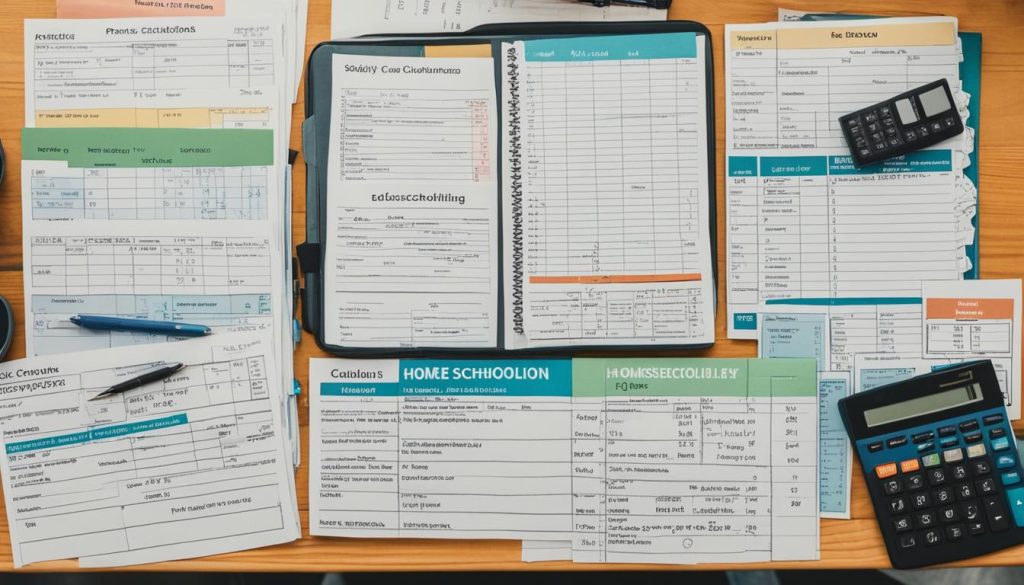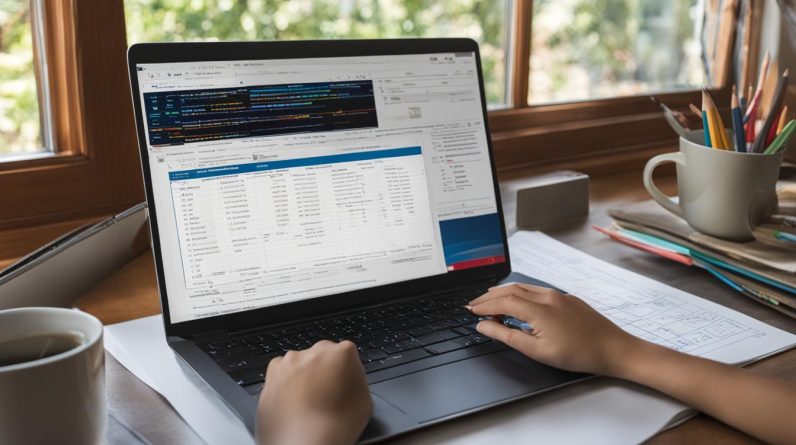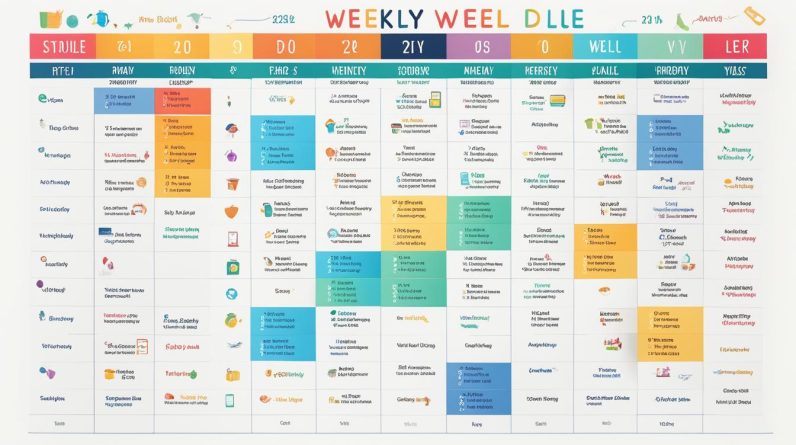Are you a homeschooling family looking to save money on educational expenses? If so, the Home School Tax Credit is your key to unlocking significant savings. This valuable tax credit offers eligible households the opportunity to reduce their tax liability and potentially receive a refund by claiming qualified homeschooling expenses on their tax return.
In this article, we will explore the eligibility requirements and benefits of the Home School Tax Credit, provide tips for maximizing your savings, and highlight other tax benefits available to homeschooling families. We’ll also discuss the importance of record-keeping, state-specific tax rules, consulting a tax professional, and staying informed about tax law changes.
It’s time to take advantage of the Home School Tax Credit and make homeschooling more affordable. Let’s dive into the details and uncover the savings that await you and your family.
Key Takeaways:
- The Home School Tax Credit can help homeschooling families save money on educational expenses.
- Eligibility requirements vary by state, so it’s important to consult with a tax professional or review your state’s guidelines.
- Maximize your tax savings by claiming all eligible expenses and keeping thorough documentation.
- There may be additional tax benefits available to homeschooling families, such as education-related tax deductions and credits.
- Consulting a tax professional can provide personalized guidance and ensure compliance with state and federal tax laws.
- Stay informed about tax law changes that may affect your homeschooling tax credits and deductions.
Understanding the Home School Tax Credit
The Home School Tax Credit is a tax benefit specifically designed for homeschooling families. It provides eligible households with a deduction or credit on their tax return for qualified homeschooling expenses. By claiming the Home School Tax Credit, homeschooling families can reduce their tax liability and potentially receive a refund.
Qualifying homeschooling expenses may include curriculum materials, textbooks, educational resources, and other supplies necessary for homeschooling. These expenses can quickly add up, but the Home School Tax Credit offers a way to offset these costs and make homeschooling more affordable.
Here is an example of how the Home School Tax Credit can benefit homeschooling families:
Meet the Johnsons, a homeschooling family of three. They incurred $3,000 in homeschooling expenses, including curriculum materials, textbooks, and educational subscriptions, during the tax year. By claiming the Home School Tax Credit, they can reduce their taxable income by $3,000, potentially resulting in a higher tax refund or a lower tax bill. This tax benefit significantly eases the financial burden of homeschooling for the Johnsons and allows them to allocate their resources more effectively.
To better understand the potential tax savings, here is a table showcasing the maximum deduction or credit amount for the Home School Tax Credit, based on different expenses:
| Homeschooling Expenses | Maximum Deduction or Credit Amount |
|---|---|
| Curriculum materials, textbooks, supplies | $1,000 |
| Educational resources, online subscriptions | $500 |
| Extracurricular activities directly related to homeschooling | $750 |
As shown in the table, the maximum deduction or credit amount can vary based on the category of expenses. By carefully tracking and categorizing your homeschooling expenses, you can ensure you claim the maximum tax benefit available to you.
Understanding the Home School Tax Credit is essential for homeschooling families looking to maximize their tax savings. By taking advantage of this tax benefit, you can significantly reduce the financial burden of homeschooling and make it more affordable for your family.
Eligibility for the Home School Tax Credit
To qualify for the Home School Tax Credit, you must meet certain eligibility criteria. These criteria may vary depending on your state’s tax laws, so it’s important to consult with a qualified tax professional or review the specific guidelines for your state.
Generally, to be eligible for the Home School Tax Credit, you should:
- Be a homeschooling parent or guardian.
- Have incurred eligible homeschooling expenses during the tax year.
Eligible homeschooling expenses may include:
- Curriculum materials
- Textbooks
- Educational resources
- Supplies necessary for homeschooling
To support your claim for the Home School Tax Credit, it is crucial to keep detailed records of your expenses. This includes saving receipts, invoices, and any other relevant documentation that demonstrates the costs you have incurred for homeschooling.
Claiming the Home School Tax Credit can help homeschooling families reduce their tax liability and potentially receive a refund. By taking advantage of this tax break, you can make homeschooling more affordable and accessible.
“The Home School Tax Credit provides an opportunity for homeschooling families to save money on their educational expenses. By meeting the eligibility requirements and keeping accurate records, you can unlock valuable tax breaks and make homeschooling more financially feasible.”
Maximizing Your Home School Tax Credit
When it comes to maximizing your Home School Tax Credit, there are a few key strategies you can implement to make the most of this valuable opportunity. By following these tips, you can ensure that you claim all eligible expenses and maximize your savings.
- Claim all eligible expenses: It’s important to review the eligibility requirements for the Home School Tax Credit and ensure that you are claiming all qualifying expenses. While curriculum materials and textbooks are commonly eligible, don’t forget to include other related expenses such as educational resources, online subscriptions, and even extracurricular activities. By claiming all eligible expenses, you can maximize your tax credit.
- Keep accurate records: To substantiate your claim, it’s essential to keep accurate records of your homeschooling expenses. Save all receipts and invoices as proof of your eligible costs. By maintaining organized records, you can easily provide the necessary documentation if required by the tax authorities.
- Consult with a tax professional: Consulting with a tax professional who specializes in homeschooling tax matters can be highly beneficial. They can provide personalized guidance and ensure that you are correctly claiming the Home School Tax Credit. Additionally, they can help you navigate any specific state or local tax regulations that may apply to homeschooling.
By implementing these strategies, you can confidently maximize your Home School Tax Credit and unlock significant savings.
Expert Tip
If you’re unsure about your eligibility or have questions about specific homeschooling expenses, it’s always best to consult with a tax professional. They can provide expert guidance tailored to your unique situation and help you make informed decisions.
| Expense | Description |
|---|---|
| Curriculum Materials | Books, workbooks, and educational supplies directly related to homeschooling. |
| Textbooks | Required textbooks for core subjects such as math, science, history, and language arts. |
| Educational Resources | Software, online subscriptions, and learning materials that enhance your homeschooling curriculum. |
| Extracurricular Activities | Activities such as music lessons, art classes, or sports programs directly related to homeschooling. |
Remember, maximizing your Home School Tax Credit requires careful attention to detail and proper documentation. By claiming all eligible expenses, keeping accurate records, and seeking guidance from a tax professional, you can ensure that you are getting the most out of this valuable tax benefit. Take advantage of the Home School Tax Credit and make homeschooling more affordable today!
Other Tax Benefits for Homeschoolers
In addition to the Home School Tax Credit, there are other tax benefits available to homeschooling families. These additional tax deductions and credits can help further reduce your homeschooling expenses and provide additional financial relief. By exploring these options and understanding how they apply to your specific situation, you can maximize your savings and make homeschooling more affordable.
Educational Tax Deductions:
One tax benefit you may be eligible for is the Lifetime Learning Credit. This credit allows you to claim a portion of your qualified education expenses as a tax credit. If you incur expenses for your homeschooling program that meet the criteria for the Lifetime Learning Credit, you can potentially receive a credit against your tax liability.
Another potential tax deduction is the Tuition and Fees Deduction. This deduction allows you to deduct qualified education expenses, including homeschooling expenses, from your taxable income. By taking advantage of this deduction, you can lower your overall tax liability and potentially receive a larger refund.
It’s important to consult with a tax professional to determine which education-related tax deductions apply to your specific situation and how to properly claim them on your tax return. They can guide you through the process and help you maximize your savings.
Maximizing Your Savings:
When considering these other tax benefits, it’s essential to keep thorough records of your homeschooling expenses. This includes documenting the costs of curriculum materials, textbooks, educational resources, and any other supplies directly related to your homeschooling program. By maintaining detailed records, you can substantiate your expenses and ensure that you are accurately claiming the applicable tax deductions and credits.
Consulting with a tax professional is highly recommended. They can provide personalized guidance on how to maximize your savings and ensure compliance with tax laws. They can also keep you informed about any changes in tax regulations that may affect your eligibility for these tax benefits.
Remember: Other education-related tax benefits may vary by state and individual circumstances. It’s important to consult with a tax professional familiar with your state’s laws to fully understand the available options.

By taking advantage of the Home School Tax Credit and exploring other education-related tax benefits, you can significantly reduce the financial burden of homeschooling. These tax benefits can help make homeschooling more affordable and allow you to provide your children with a quality education at home. Make sure to consult with a tax professional for personalized advice tailored to your unique situation and maximize your savings.
Tips for Record-Keeping and Documentation
When it comes to claiming the Home School Tax Credit, proper record-keeping and documentation are essential. Keeping detailed records of your homeschooling expenses is crucial to ensure you can accurately report your eligible deductions. Here are some tips to help you effectively manage your homeschool tax documentation:
Create a Dedicated Folder or File
Start by organizing all your receipts, invoices, and proof of payment in a designated folder or file. This will make it easier to locate and retrieve the necessary documents when it’s time to prepare your taxes. Remember to keep this folder updated throughout the year as you incur homeschooling expenses.
Maintain Detailed Expense Records
Record all your homeschooling expenses, including curriculum materials, textbooks, educational resources, and any other supplies directly related to homeschooling. Be sure to note the date, description, and amount of each expense. This level of detail will strengthen your claim for the Home School Tax Credit and provide the necessary evidence in case of an audit.
Consider a Homeschooling Log or Journal
In addition to financial documentation, consider keeping a log or journal of your homeschooling activities and lessons. This can serve as supplementary evidence to demonstrate the educational nature of your homeschooling program. Documenting the topics covered, learning objectives, and progress made throughout the year can help support your claim for the tax credit.

Organize Electronic Documents
If you receive electronic receipts or invoices, create a digital folder on your computer or cloud storage to keep these documents organized. Be sure to name the files appropriately and store them in a secure location. Having electronic copies of your documentation provides an additional backup and makes it easier to access the information when needed.
Consult a Tax Professional
If you’re unsure about the specific documentation requirements or need guidance on how to correctly claim the Home School Tax Credit, consult a qualified tax professional. They can provide personalized advice based on your individual circumstances and ensure you’re maximizing your tax benefits while staying compliant with the relevant tax regulations.
By following these record-keeping and documentation tips, you can confidently claim the Home School Tax Credit and maximize your savings. Keeping thorough records will not only help you during tax season but also provide peace of mind knowing that you have the necessary evidence to support your claim.
State-Specific Tax Rules for Homeschoolers
When it comes to homeschooling, it’s essential to understand that tax rules and regulations can vary by state. Each state has its own specific requirements, deductions, and credits related to homeschooling expenses. Therefore, it’s crucial to research and comprehend the tax laws in your state to ensure compliance and take advantage of all available tax benefits.
To gain a thorough understanding of the tax rules for homeschoolers in your state, consider the following:
- Consult a Tax Professional: A knowledgeable tax professional can provide you with personalized advice based on your specific homeschooling situation. They can help you navigate the complexities of state tax laws, identify applicable deductions and credits, and ensure compliance. Working with a tax professional can give you peace of mind, knowing that you are maximizing your tax savings.
- Visit Your State’s Department of Revenue Website: Each state’s department of revenue website provides valuable information on tax regulations and laws specific to homeschooling. These resources can help you understand the eligibility requirements, deductions, and credits relevant to your state. It’s crucial to stay up-to-date with any changes or updates to ensure you take full advantage of available tax benefits.
By familiarizing yourself with the state-specific tax rules for homeschoolers, you can ensure compliance and optimize your tax savings. Remember, consulting a tax professional and utilizing state resources are essential steps in navigating the intricacies of homeschooling tax laws in your state.
State-Specific Tax Regulations for Homeschooling Expenses
| State | Tax Regulations | Eligible Deductions and Credits |
|---|---|---|
| California | California allows homeschooling expenses to be classified as educational expenses and deducted accordingly. | – Homeschooling curriculum costs – Educational resources – Tutoring expenses |
| Texas | Texas does not provide specific tax breaks for homeschooling expenses. However, homeschoolers may take advantage of general education-related deductions and credits. | – Tuition and fees deduction – Lifetime Learning Credit |
| Florida | Florida has no state income tax, which means homeschoolers do not have the opportunity to claim tax deductions or credits for homeschooling expenses. | N/A |
It’s important to note that the information provided in the table above is for illustrative purposes only. Tax regulations and available deductions and credits can change, so it’s crucial to consult with a tax professional or visit your state’s department of revenue website for the most accurate and up-to-date information.

By understanding and adhering to the state-specific tax rules for homeschooling, you can ensure compliance, optimize your tax savings, and make your homeschooling journey more financially manageable.
Consulting a Tax Professional for Guidance
As a homeschooling family, navigating the tax laws and regulations can be complex and overwhelming. That’s why it’s wise to seek the expertise of a qualified tax professional for guidance.
A tax expert can provide personalized advice based on your specific homeschooling situation and help you maximize your tax savings. They have in-depth knowledge of the tax laws and can assist you in determining your eligibility for the Home School Tax Credit, as well as identifying other applicable tax benefits.
By working with a tax professional, you can ensure that you are in compliance with state and federal tax laws while optimizing your tax planning for homeschooling families. They will review your expenses, deductions, and credits to help you make the most of the available tax benefits.
Here are some ways a tax professional can assist you:
- Provide personalized tax advice tailored to your homeschooling situation.
- Assist in determining your eligibility for the Home School Tax Credit.
- Identify other applicable tax benefits for homeschoolers.
- Ensure compliance with state and federal tax laws.
- Maximize your tax savings.
Working with a tax professional can give you peace of mind, knowing that your homeschooling tax matters are being handled efficiently and accurately. They will guide you through the complexities of tax planning for homeschooling families, helping you navigate the intricacies of your unique tax situation.
Remember, tax laws change frequently, and it’s crucial to stay updated. A tax professional can keep you informed about any tax law changes that may impact your homeschooling tax credits and deductions.
Consulting a tax professional is a proactive approach to managing your homeschooling finances. It ensures that you are making informed decisions and taking full advantage of all available tax benefits. With their expertise, you can focus on providing the best education for your children while optimizing your homeschooling tax planning.

Stay Informed About Tax Law Changes
Tax laws and regulations are subject to change, and it is crucial for homeschooling families to stay informed about any updates or revisions that may impact their tax credits and deductions. By staying up to date with the latest tax news and changes, especially those related to homeschooling, you can ensure that you are taking full advantage of all available tax benefits and optimizing your homeschooling tax savings.
Keep yourself informed through reputable sources such as tax publications, government websites, and trusted tax professionals. These sources provide reliable information on updated tax regulations, changes in homeschooling tax credits, and any other relevant updates that may affect your tax planning. By actively seeking out this information, you can stay ahead of the curve and make informed decisions when it comes to your homeschooling tax strategies.
Remember that tax laws can be complex and may differ based on your state. It is advisable to consult a qualified tax professional who specializes in homeschooling tax matters. They can provide personalized guidance based on your specific circumstances and ensure that you are in compliance with all applicable tax laws. A tax professional can also help you navigate the changes in tax regulations and identify new opportunities to maximize your homeschooling tax benefits.
“Staying informed about tax law changes and updates is essential for homeschooling families. By proactively seeking out reliable sources of information and working with qualified tax professionals, you can optimize your homeschooling tax savings and ensure compliance with all relevant regulations.”
Being aware of the latest tax law changes is essential to ensure that you are not missing out on any potential tax benefits or risking non-compliance. Taking the time to stay informed provides peace of mind and allows you to make the most of your homeschooling tax deductions and credits.
| Tax Law Changes | Impact on Homeschooling Tax Credits |
|---|---|
| Update to tax regulation XYZ | Increased homeschooling tax credits for eligible expenses |
| Revision in tax law ABC | Expanded eligibility criteria for homeschooling tax deductions |
| New legislation for education-related tax benefits | Potential additional tax breaks for homeschooling families |
Conclusion
The Home School Tax Credit is a valuable opportunity for homeschooling families to unlock significant savings on their educational expenses. By understanding the eligibility requirements, maximizing your tax deductions and credits, and staying informed about tax law changes, you can make the most of this tax benefit and ensure that your educational costs are more manageable.
To take full advantage of the Home School Tax Credit, it is important to keep detailed records of your homeschooling expenses. Documenting your curriculum materials, textbooks, educational resources, and other supplies will provide the necessary evidence to support your claim for the tax credit. Additionally, consulting with a tax professional will ensure that you are correctly claiming the credit and maximizing your savings.
By utilizing the Home School Tax Credit, you can not only reduce your tax liability but also have more funds available for your homeschooling needs. This tax benefit helps homeschooling families save money, making homeschooling more affordable and accessible. Start unlocking your savings today and make the most of the Home School Tax Credit!
FAQ
What is the Home School Tax Credit?
The Home School Tax Credit is a tax benefit specifically designed for homeschooling families. It provides eligible households with a deduction or credit on their tax return for qualified homeschooling expenses.
What expenses can be claimed under the Home School Tax Credit?
Qualified homeschooling expenses that can be claimed under the Home School Tax Credit include curriculum materials, textbooks, educational resources, and other supplies necessary for homeschooling.
How do I qualify for the Home School Tax Credit?
To qualify for the Home School Tax Credit, you must be a homeschooling parent or guardian and have incurred eligible homeschooling expenses during the tax year. Eligibility criteria may vary by state, so consult with a tax professional or review your state’s guidelines for more information.
How can I maximize my Home School Tax Credit?
To maximize your Home School Tax Credit, make sure to claim all eligible expenses, keep accurate records of your homeschooling costs, and consult with a tax professional or use tax preparation software to ensure you are claiming the credit correctly.
Are there any other tax benefits available to homeschooling families?
Yes, in addition to the Home School Tax Credit, there may be other education-related tax deductions and credits available to homeschooling families, such as the Lifetime Learning Credit or the Tuition and Fees Deduction. Consult with a tax professional to determine which benefits apply to your situation.
What documentation do I need to support my claim for the Home School Tax Credit?
It is crucial to keep detailed records of your homeschooling expenses, including receipts, invoices, and proof of payment. Organize these documents in a designated folder or file and consider keeping a log or journal of your homeschooling activities and lessons.
Do the tax rules for homeschooling vary by state?
Yes, tax rules and regulations for homeschooling vary by state. Each state may have its own specific requirements, deductions, and credits related to homeschooling expenses. Research and understand the tax laws in your state to ensure compliance and take advantage of all available tax benefits.
Should I consult a tax professional for help with my homeschooling tax matters?
Yes, it is wise to consult with a qualified tax professional for guidance. A tax expert can provide personalized advice based on your specific homeschooling situation and help you maximize your tax savings. They can assist with determining your eligibility, identifying other applicable tax benefits, and ensuring compliance with state and federal tax laws.
How can I stay informed about changes in homeschooling tax credits?
Tax laws and regulations can change, so it’s important to stay informed about any updates or revisions that may affect your tax credits and deductions. Keep up with the latest tax news and changes through reputable sources such as tax publications, government websites, and trusted tax professionals.
What are the benefits of the Home School Tax Credit?
The Home School Tax Credit offers valuable savings opportunities for homeschooling families. By understanding the eligibility requirements, maximizing your tax deductions and credits, and staying informed about tax law changes, you can make the most of this tax benefit and save money on your homeschooling costs.






